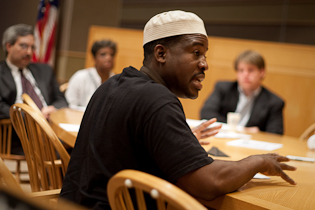 After an emphatic math lesson in youth violence and public spending from a police officer/ youth worker, an aldermanic committee voted to approve the city’s purchase of the Dixwell Community “Q” House.
After an emphatic math lesson in youth violence and public spending from a police officer/ youth worker, an aldermanic committee voted to approve the city’s purchase of the Dixwell Community “Q” House.
The committee approval Thursday night means that the venerable community center at 197 Dixwell Ave. is one step closer to reopening, after shutting its doors six years ago. The closure has become a symbolic focal point for community frustration over the lack of activities for young people who get in trouble.
If the full Board of Aldermen approves the plan, the city will buy the Q House, which is now languishing in bankruptcy court, for $225,000, in the hopes of facilitating its revival as a central institution in New Haven’s black community.
Shafiq Abdussabur, a city cop and youth development leader, was one of several members of the public who urged the Board of Aldermen’s Joint Community Development-Finance Committee on Thursday night to approve the plan, which was laid out earlier this month.
Abdussabur went further than other speakers, arguing that the city should not only buy the building, but commit to ten years of funding all programming and associated costs at the center.
Such a plan would actually save the city money, Abdussabur told the committee. Youth programming would curtail gun violence, he said, thereby eliminating millions spent on police overtime and medical care for gunshot victims without health insurance.
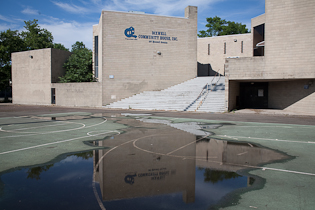 The committee did not take up Abdussabur’s proposal. But it did pass an amendment to the proposed purchase agreement that would require the city to provide professional and technical support to the organization that is charged with creating a plan for the future of the center. The Concerned Citizens for Greater New Haven Dixwell Community Center, a nonprofit group planning the resurrection of the Q House (pictured), has six months to come up with a proposal for the future of the institution.
The committee did not take up Abdussabur’s proposal. But it did pass an amendment to the proposed purchase agreement that would require the city to provide professional and technical support to the organization that is charged with creating a plan for the future of the center. The Concerned Citizens for Greater New Haven Dixwell Community Center, a nonprofit group planning the resurrection of the Q House (pictured), has six months to come up with a proposal for the future of the institution.
If the Concerned Citizens are able to come up with a plan that satisfies the city, the group will take leadership over the building and open it as a community center. If they don’t come up with a workable proposal, the city will look at other uses. It’s not yet clear if the group’s proposal will include the purchase of the property from the city, or if the city will continue to own the building.
The Concerned Citizens face a daunting task. Engineers estimate that the Q House will need $2.5 million in repairs. The Concerned Citizens also must design a plan for the programs inside the building. Further, the group needs to find a way for the Q House to be a sustainable venture, so that it doesn’t end up back in bankruptcy court.
This possibility was on the minds of several aldermen. East Rock Alderman Roland Lemar noted the millions of dollars necessary to rehab the building.
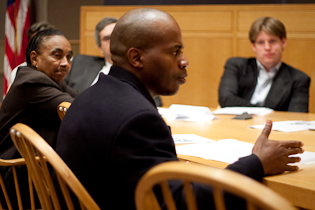 “That’s part of what we’re asking the community group to consider,” said Che Dawson (pictured),city government’s director of youth policy, who is spearheading the proposal. The city recognizes that the building is a community asset, he said.
“That’s part of what we’re asking the community group to consider,” said Che Dawson (pictured),city government’s director of youth policy, who is spearheading the proposal. The city recognizes that the building is a community asset, he said.
“I just want to make sure that we’re not setting the citizens group up to fail,” said Fair Haven Alderwoman Migdalia Castro. It’s in the best interests of the city to “make sure this works,” she said.
Aldermen agreed that the city should work closely with the Concerned Citizens, meet with them regularly, and make sure that, as Hill Alderwoman Andrea Jackson-Brooks put it, the city doesn’t end up with a “‘trick bag’ at the end of the month that doesn’t meet the criteria.”
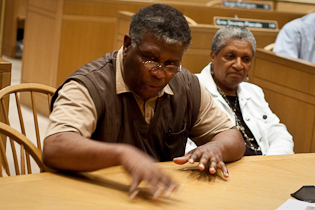 Representatives of the Concerned Citizens addressed the committee, speaking — passionately at times — of the historical significance of the Q House and the vital need for its services today. Concerned Citiizens Chairperson Jacqueline Bracey (at right in photo) reminded the aldermen that the Q House was the birthplace of the country’s first black Girl Scout troop.
Representatives of the Concerned Citizens addressed the committee, speaking — passionately at times — of the historical significance of the Q House and the vital need for its services today. Concerned Citiizens Chairperson Jacqueline Bracey (at right in photo) reminded the aldermen that the Q House was the birthplace of the country’s first black Girl Scout troop.
Former New Haven Mayor John Daniels (pictured) spoke of the institution’s significance in his own life. “I happen to be a product of the Q House, he said. Daniels credited the center for his career as a mayor, state senator, and alderman.
The city has a responsibility to “keep a place like the Q House going,” said Bea Dozier-Taylor, a member of the Concerned Citizens. The center is key to breaking a cycle of youth problems, she said.
When it was his turn to speak, Shafiq Abdussabur upped the ante. Not only does the city have a responsibility to buy the property, Abdussabur argued. It should commit to ten years of funding the operations of the Q House.
Abdussabur said that youth programs like his CTRIBAT violence prevention organization should not have to operate on a “food stamp budget.”
“Kids are dying in our communities,” he said. “And they have no outlet.”
Abdussabur then launched into his math lesson. Adding up the police costs of arresting a child a day for a year, he came up with a figure of $91,000. “And that’s just a basic arrest,” he said.
Gun violence is even more expensive, he said. Since most victims are African-American males living below the poverty line with no health insurance, the cost of health care for gunshot victims falls to taxpayers, Abdussabur said. By his reckoning, they city has spent over $8 million in such costs so far this year, “for six people to die in the city.”
Plus, there’s “at least $40,000 per non-fatal gunshot,” Abdussabur said. That adds up to another $3.2 million so far this year, he said.
“The city of New Haven has committed itself to $8 million of debt,” he said, “for nothing. We get nothing back.” He went on to add up $5 million in police overtime spent dealing with gun violence. “And we have no community center in lower Dixwell.”
“We have to make a full-scale commitment,” Abdussabur said. “Because if we don’t, we’re going to spend the money whether we like it or not.”
There was no discussion of Abdussabur’s call for greater city investment in the Q House.
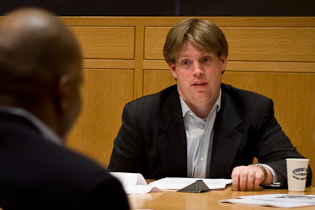 “I disagree that it’s a core city responsibility to own and operate an enormous youth center,” said Roland Lemar (pictured), after the meeting. He pointed out the many commitments that the city has already made to youth programming, like having schools stay open late and the Youth At Work program.
“I disagree that it’s a core city responsibility to own and operate an enormous youth center,” said Roland Lemar (pictured), after the meeting. He pointed out the many commitments that the city has already made to youth programming, like having schools stay open late and the Youth At Work program.
“Personally, I’m not in favor of the city running the Q House,” said Concerned Citizens Chairperson Jacqueline Bracey.
“It needs to be city operated, city controlled, and city funded,” Abdussabur reiterated later. “If we know we’re going to spend this money by not reacting, why not put the money up front? For me it’s a slam dunk.”
Abdussabur didn’t express surprise that the aldermen hadn’t responded to his call for ten years of total city support. “Our approach on how we explain it to people is so new,” he said. “It just takes time to digest.”